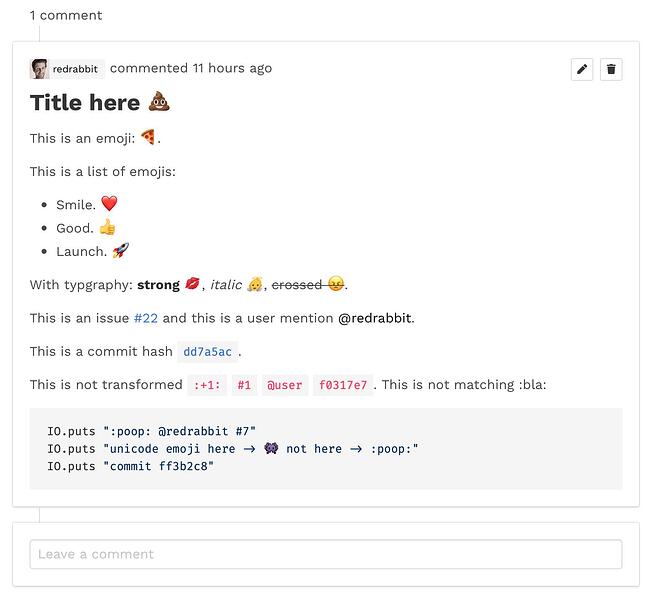I started experimenting with the AST. Pretty straight forward for what I want to do:
defmodule GitGud.Web.Markdown do
@moduledoc """
Conveniences for rendering Markdown.
"""
@doc """
Renders a Markdown formatted `content` to HTML.
"""
@spec markdown(binary | nil) :: binary | nil
def markdown(nil), do: nil
def markdown(content) do
case Earmark.as_ast(content) do
{:ok, ast, _warnings} ->
ast
|> transform_ast()
|> Floki.raw_html()
end
end
#
# Helpers
#
defp transform_ast(ast) do
ast
|> Enum.map(&transform_ast_node/1)
|> List.flatten()
end
defp transform_ast_node({tag, _attrs, _ast} = node) when tag in ["code"], do: node
defp transform_ast_node({tag, attrs, ast}) do
{tag, attrs, transform_ast(ast)}
end
defp transform_ast_node(content) when is_binary(content) do
content = Regex.replace(~r/:([a-z0-1\+]+):/, content, &emojify_short_name/2)
auto_link(content, Regex.scan(~r/#[0-9]+|@[a-zA-Z0-9_-]+|[a-f0-9]{7}/, content, return: :index))
end
defp emojify_short_name(match, short_name) do
if emoji = Exmoji.from_short_name(short_name),
do: Exmoji.EmojiChar.render(emoji),
else: match
end
defp auto_link(content, []), do: content
defp auto_link(content, indexes) do
{content, rest, _offset} =
Enum.reduce(List.flatten(indexes), {[], content, 0}, fn {idx, len}, {acc, rest, offset} ->
{head, rest} = String.split_at(rest, idx - offset)
{link, rest} =
case String.split_at(rest, len) do
{"#" <> number, rest} ->
{{"a", [], ["##{number}"]}, rest} # TODO
{"@" <> login, rest} ->
{{"a", [{"class", "has-text-black"}], ["@#{login}"]}, rest} # TODO
{hash, rest} ->
{{"a", [], [{"code", [{"class", "has-text-link"}], [hash]}]}, rest} # TODO
end
{acc ++ [head, link], rest, idx+len}
end)
List.flatten(content, [rest])
end
end

 )
)























